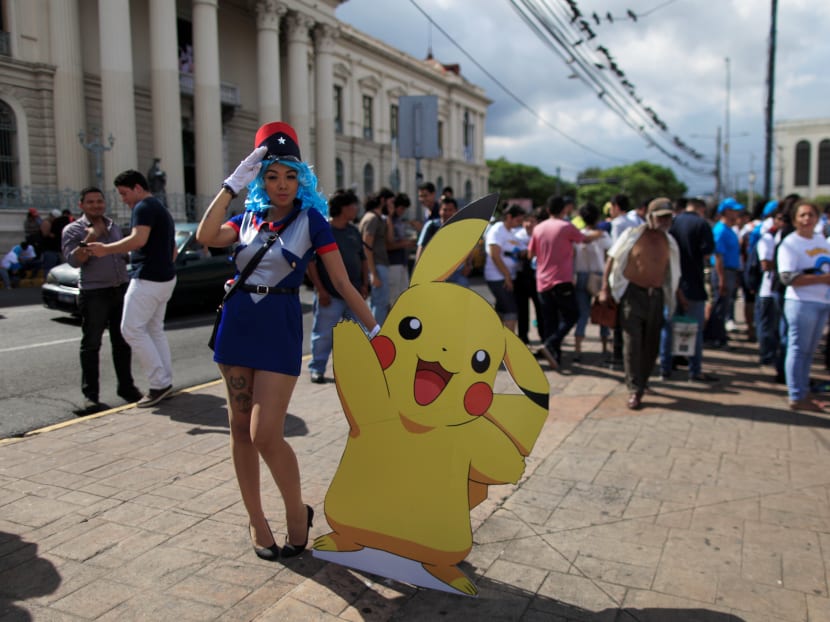Pokemon Go craze befuddles analysts from big investment banks
TOKYO — Pokemon Go’s stunning surge in popularity is leaving few more befuddled than the analysts who cover Nintendo for the world’s biggest investment banks.

A cosplayer in El Salvador dressed as a character of the augmented reality mobile game Pokemon Go. Photo: Reuters
TOKYO — Pokemon Go’s stunning surge in popularity is leaving few more befuddled than the analysts who cover Nintendo for the world’s biggest investment banks.
Take Bank of America’s Hiroyasu Eguchi. He cut his rating on the stock in April and lowered his price target on July 6 — one day before Pokemon Go debuted in the US and shares began a tear that more than doubled their price over two weeks. Mr Eguchi reversed course this week: On Monday, he upgraded the stock to a buy rating and set a price target that’s almost double the current level.
He is not the only one playing catch up. One week prior to Pokemon Go’s release, Mitsubishi UFJ Morgan Stanley Securities’s Hirotoshi Murakami cut his Nintendo price target to the lowest since April 2015. After the stock soared, Mr Murakami backtracked and now expects shares to climb 71 per cent from Tuesday’s close.
The game’s groundbreaking debut took almost everyone by surprise, and Nintendo’s communication hasn’t helped. The Kyoto-based company stood by for more than two weeks as the game’s release added US$20 billion (S$27 billion) to its market value. Then, in a stunning announcement after 7pm on Friday in Tokyo, it said the earnings impact from the game will be limited. When shares traded on Monday, they fell the most in 26 years.
“It shows there’s not quite enough discipline in the Japanese market about what you can say, when you can say it, and how you have to say it fairly to everybody,” said Mr Nicholas Benes, representative director of the Board Director Training Institute of Japan. “We need a little bit more discipline in the rules that purport to be regulating fair disclosure.”
Nintendo shares fell 5.5 per cent to ¥22,305 (S$287) in Tokyo, before the company reported a wider-than-projected loss of ¥24.5 billion for the fiscal first quarter. While the hit game wasn’t reflected in the report, the company had more bad news to share: It said Pokemon Go Plus, an accessory gadget, will be delayed until September, and the stock fell as much as 12 per cent in Germany.
Another point of exasperation for analysts and investors is the lack of disclosure about Nintendo’s financial interest in Pokemon Go. Nintendo doesn’t own the game outright, as investors may have thought. Rather, the game was jointly developed by Pokemon and Niantic. Nintendo owns about one third of Pokemon and said it made an investment in Niantic last year, but did not disclose the size of that stake.
While companies are not required to disclose details about their investments, Nintendo’s omission means analysts are mostly left to guess about a revenue stream that’s potentially worth billions. Macquarie Securities’ David Gibson estimates it to be 13 per cent, while Jefferies Group’s Atul Goyal projects it could be as much as 40 to 50 per cent.
“Management has left a lot to be desired in communicating adequately,” Mr Goyal wrote in a note to clients on Tuesday.
Bank of America’s Eguchi published his report after the market closed on Monday when Nintendo shares had already dropped 18 per cent. Despite the company’s warning, he argued that investors are underestimating the company’s potential to benefit from Pokemon Go’s technology and introduce well-known characters such as Mario and Donkey Kong across new platforms. He raised his rating to a buy and set a price target of ¥45,500, the highest of any analyst covering the stock.
His call is far from the consensus view. The average price target among Nintendo analysts is actually a few hundred yen below Tuesday’s closing price. His target is 96 per cent higher than the average and 13 per cent above the next highest estimate. Mr Eguchi sees the potential for profits to nearly triple next year as the company taps its intellectual property for new products including mobile games with Pokemon Go-like augmented reality.
“Pokemon Go is a game changer,” Mr Eguchi wrote. “Pokemon Go not only refreshes the company’s suite of well-loved characters in the consumer consciousness, but also clearly indicates the company’s embrace of open platforms, unlocking its IP potential across untapped brand extensions, from movies and theme parks to branded merchandise and in-app advertising.”
For others, Monday’s historic drop looks like just the beginning. SMBC Nikko Securities’s Eiji Maeda remains sceptical about the company’s ability to produce hits for smartphones. He points out Pokemon Go is the result of Niantic’s work, not Nintendo’s.
“Nintendo may have provided advice, but Niantic are the ones who made it and operate it,” he said. “It’s quite an achievement that they connected Niantic with Pokemon, but it’s a little difficult to say that it is Nintendo who gave birth to a huge hit.”
While Bank of America’s Eguchi has the highest price target on Nintendo’s shares, Mr Maeda has the lowest. He sees the stock heading to ¥14,500, 39 per cent below Tuesday’s close. Mr Maeda has at least been consistent throughout the Pokemon Go tumult: He’s maintained his underperform rating on shares since January. BLOOMBERG





